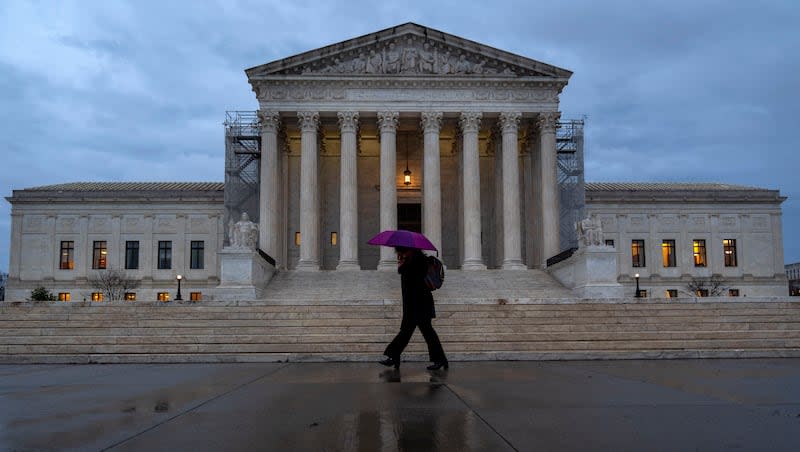Will the Supreme Court uphold a ban on bump stocks?

- Oops!Something went wrong.Please try again later.
The future of federal gun control is in the hands of the Supreme Court.
The justices will soon clarify how much power a president has to put forward new gun policies in a case that stems from the Trump administration’s 2018 ban on bump stocks.
If the court overturns the ban, it will become harder to regulate gun access with administrative rules. The executive branch would instead need to lean on Congress, which hasn’t passed a significant gun control measure in years.
What is a bump stock?
The Supreme Court case, called Garland v. Cargill, centers on bump stocks, devices that modify semiautomatic rifles to make it easier to shoot hundreds of rounds in quick succession, according to The Washington Post.
“The device harnesses a gun’s natural recoil, allowing the rifle to bounce or ‘bump’ rapidly back and forth off a shooter’s trigger finger. Rifles equipped with bump stocks can fire an estimated 400 to 800 bullets per minute,” the article said.
Bump stocks have been used in some recent mass shootings, including the 2017 attack on a music festival in Las Vegas that left 60 people dead and hundreds injured.
The bump stock case
After the Las Vegas music festival shooting, the Trump administration moved to ban bump stocks through the federal rulemaking process.
Officials based the new rule on a 1986 law prohibiting the purchase or sale of machine guns. They argued that a semiautomatic rifle with a bump stock amounts to a machine gun since the modified weapon fires dozens of rounds with little effort from the shooter.
The Supreme Court case came about because not everyone accepts this argument.
Michael Cargill, a U.S. Army veteran who owns a gun store in Austin, says in the lawsuit that bump stocks do not fit the legal definition of a machine gun since they do not continuously fire with “a single function of the trigger,” per The Washington Post. Instead, they require steady, continuous pressure on the weapon.
During Wednesday’s oral arguments in the case, Cargill’s attorney “stressed that even if the shooter is simply applying ‘constant pressure with the same amount of force,’ he is still acting manually, rather than automatically,” SCOTUSblog reported.
Cargill and his attorneys are squaring off against the Biden administration, which shares the Trump administration’s belief that guns with bump stocks should be considered machine guns under the law.
The Biden administration asked the Supreme Court to intervene in the case after the 5th U.S. Circuit Court of Appeals ruled in favor of Cargill.
How will the Supreme Court rule on bump stocks?
During oral arguments Wednesday, the Supreme Court appeared divided over the bump stock ban, although not along the typical conservative-liberal dividing line.
The three more liberal justices all appeared supportive of the ban, and so did, at various points, a few of the more conservative justices.
“Justice Clarence Thomas noted that the statute was initially passed because of the lethality of machine guns. Behind the latest ban, he said, is the ‘notion that the bump stock does the exact same thing.’ Justice Samuel A. Alito Jr. asked (Cargill’s attorney) if he could imagine a legislator thinking Congress should ban machine guns but not bump stocks,” The Washington Post reported.
Some conservative justices expressed concern about what will happen if the court upholds the ban. Attorneys for the Biden administration said people who currently own bump stocks could be held criminally liable even if they didn’t realize the ban was in place, SCOTUSblog reported.
Several justices shared concerns about gun violence during Wednesday’s arguments, but some added that such concerns don’t change the court’s duty to properly interpret the law.
The Supreme Court’s ruling in the bump stock case is expected by the end of June.

